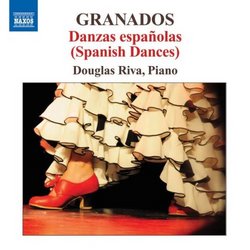| All Artists: Enrique Granados, Douglas Riva Title: Piano Music 1 - Danzas Espanolas Members Wishing: 0 Total Copies: 0 Label: Naxos Original Release Date: 1/1/2010 Re-Release Date: 5/25/2010 Genre: Classical Styles: Historical Periods, Classical (c.1770-1830) Number of Discs: 1 SwapaCD Credits: 1 UPC: 747313231379 |
Search - Enrique Granados, Douglas Riva :: Piano Music 1 - Danzas Espanolas
 | Enrique Granados, Douglas Riva Piano Music 1 - Danzas Espanolas Genre: Classical
|
Larger Image |
CD Details |
CD ReviewsSome of the Most Enduring and Lovely Spanish Piano Music, Ex J Scott Morrison | Middlebury VT, USA | 06/14/2010 (5 out of 5 stars) "Douglas Riva, an American pianist/musicologist living in Spain and New Mexico, produced a complete edition of the piano music of Enrique Granados (1867-1916) in collaboration with the late, great Spanish pianist Alicia de Larrocha. This edition contains over 100 works that had never been published before, all of them discovered by Mr Riva. And over the last several years he has been recording all of Granados' piano works for Naxos. Oddly, after about ten other volumes have been published, here comes Volume One. I suppose the numbering system may reflect the order of composition or publication. The 'Danzas Españolas' ('Spanish Dances') on this disc are certainly Granados' earliest universally acclaimed masterpieces. Although the dates of composition of this set has long been controversial, it has recently been established that they were composed in 1887-1889 (not in 1883, at the age of sixteen, as had been thought earlier). They contain what is arguably his most familiar piece, No. 5 in the series, 'Andaluza', which you know even if you don't realize you do.
The set of Spanish Dances includes twelve separate pieces representing dance forms from all over Spain. Granados gave names to only two of them: No. 4 'Villanesca' and No. 7 'Valenciana'. The other titles were added in subsequent published versions, but all seem apt. (It must be noted that there is much variation in the names: This CD's 'Galante' is often called 'Minueto'. 'Fandango' = 'Sarabanda'. 'Sardana' = 'Asturiana'. 'Romántica' = 'Mazurca'. 'Melancolica' = 'Danza Triste'. 'Bolero'= 'Zambra'.) And the order of playing varies, too, in other recordings and published versions. The Dances are characterized by the full flowering of Granados' style of evoking quintessential Spanish harmonies and rhythms. They are highly perfumed, harmonically extremely subtle and allusive, and always rhythmically engaging. Moorish influences are never far away, especially in the lovely, melancholy 'Oriental' and the melismatic 'Arabesca'. And of course the transfigured rhythms of guitars are almost omnipresent. The 'Danzas' occupy a place in Spanish piano music roughly analogous to that of Grieg's piano music in the Norwegian musical literature. Frankly, though, it strikes me that Granados' Spanish-influenced music is the more harmonically and rhythmically complex. There have been other wonderful recordings of the 'Danzas Españolas', most notably by the greatest Spanish pianist of them all, Alicia de Larrocha, whose passing late last year is mourned by all lovers of pianism. Granados: Spanish Dances or Granados: Danzas Españolas. There is another CD on the this Naxos label by Rosa Torres-Pardo which is lovely but not, in my opinion, quite as good as this one. Granados: 12 Danzas españolas (12 Spanish Dances) Make no mistake, Douglas Riva is a marvelous pianist whose devotion to the music of Granados is apparent in every measure of this recording. Delicacy, subtlety, color, élan, exoticism all exist in great abundance. The budget price of this recording makes it all the more attractive. Scott Morrisonn" |

 Track Listings (13) - Disc #1
Track Listings (13) - Disc #1